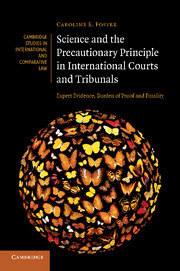 Science and the Precautionary Principle in International Courts and Tribunals
Science and the Precautionary Principle in International Courts and Tribunals Published online by Cambridge University Press: 11 April 2011
A close engagement with the science, and with the testimony of scientific experts, is becoming an inevitable feature of the international adjudication of disputes involving potential harm to human health or the environment. Even the most traditional of the international courts, the International Court of Justice, has been giving careful consideration to this issue. Greater use of the diverse procedures addressed in the previous chapter, particularly the consultation of experts appointed by a court or tribunal, will require a revisitation of the fundamental tenets of international adjudication. Perhaps the most central of these tenets is that the tribunal to which a dispute is submitted alone has the authority to take a binding decision on the issues raised by a case, and that a tribunal's findings must be based on its own convictions.
The need for tribunals to be alert to the possibility of inadvertent delegation to experts was emphasised by White in 1965. White underlined that the role of the independent expert was limited to assisting a tribunal in the establishment or elucidation of matters of fact. In principle, it is the tribunal and not the expert who is tasked with identifying the relevance and significance of the factual aspects of a case. Thus Sandifer has emphasised ‘the importance of limiting the use of experts to questions susceptible to resolution by reference to reasonably well established scientific and technical standards’.
To save this book to your Kindle, first ensure [email protected] is added to your Approved Personal Document E-mail List under your Personal Document Settings on the Manage Your Content and Devices page of your Amazon account. Then enter the ‘name’ part of your Kindle email address below. Find out more about saving to your Kindle.
Note you can select to save to either the @free.kindle.com or @kindle.com variations. ‘@free.kindle.com’ emails are free but can only be saved to your device when it is connected to wi-fi. ‘@kindle.com’ emails can be delivered even when you are not connected to wi-fi, but note that service fees apply.
Find out more about the Kindle Personal Document Service.
To save content items to your account, please confirm that you agree to abide by our usage policies. If this is the first time you use this feature, you will be asked to authorise Cambridge Core to connect with your account. Find out more about saving content to Dropbox.
To save content items to your account, please confirm that you agree to abide by our usage policies. If this is the first time you use this feature, you will be asked to authorise Cambridge Core to connect with your account. Find out more about saving content to Google Drive.